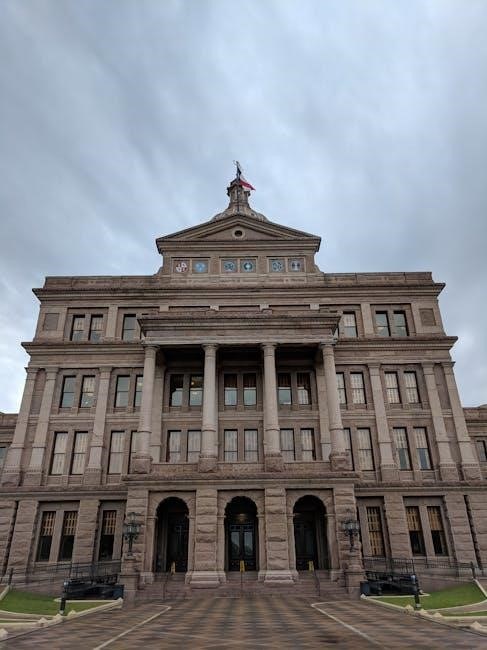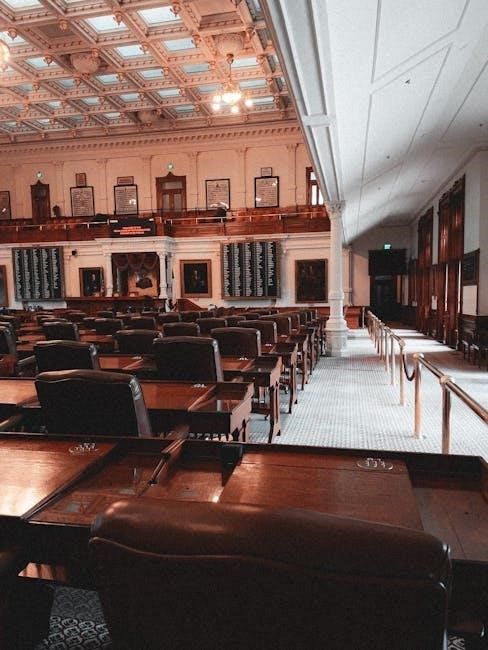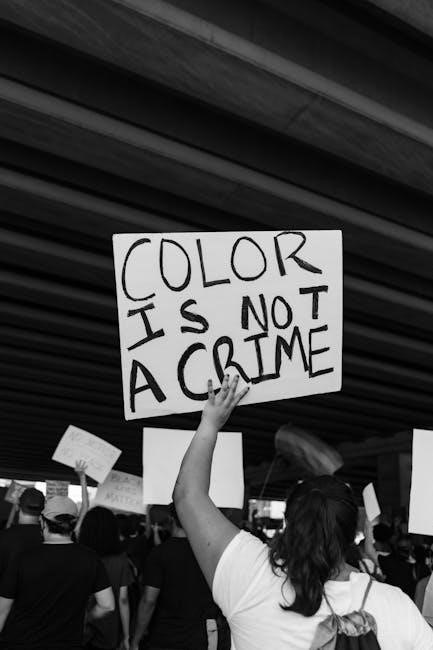Texas Politics: Ideal and Reality explores the state’s governance through democratic ideals, political conservatism, and the reality of modern governance, highlighting the role of money, lobbying, and demographic shifts.

The Idealistic Vision of Texas Politics
The idealistic vision of Texas politics embodies limited government, individual liberty, and free-market principles, reflecting a commitment to democratic ideals and civic engagement aimed at fostering freedom and prosperity.
Limited Government and Individual Liberty
The principle of limited government is central to Texas politics, emphasizing minimal state intervention in personal and economic matters. This ideal aligns with the broader American tradition of individual liberty. Texans often express a strong preference for reducing bureaucratic oversight and promoting self-reliance.
Historically, this perspective has shaped policies such as lower taxes and deregulation, aiming to empower individuals and businesses. However, critics argue that limited government can sometimes lead to inadequate public services and increased inequality.
The tension between preserving individual freedoms and addressing societal needs remains a key debate in Texas’s political landscape, reflecting the broader struggle to balance liberty with governance in a rapidly changing state.
Free-Market Principles and Economic Freedom
Free-market principles are a cornerstone of Texas’s political ideology, fostering economic freedom and entrepreneurship. The state’s business-friendly environment, characterized by low taxes and minimal regulations, attracts companies and drives growth.
This approach is often credited with Texas’s robust economy, particularly in sectors like energy and technology. However, critics argue that deregulation can lead to environmental concerns and labor exploitation.
The emphasis on economic freedom reflects a broader belief in individual responsibility and limited government interference, shaping Texas’s unique political and economic identity. This philosophy continues to influence policy decisions, promoting a competitive and innovative marketplace.
Democratic Ideals and Civic Engagement
Democratic ideals in Texas politics emphasize individual rights, representation, and civic participation. The state’s political culture promotes the idea that government should reflect the will of the people.
However, challenges such as low voter turnout and restrictive voting laws often hinder civic engagement. Texas has faced criticism for its voter ID requirements and redistricting practices, which some argue disenfranchise marginalized communities.
Despite these obstacles, grassroots movements and advocacy groups work to increase political awareness and participation. Education and civic literacy are seen as key tools to empower citizens and ensure that democratic ideals are upheld.
The interplay between these ideals and the reality of governance highlights the ongoing struggle to balance individual freedoms with collective responsibility, shaping Texas’s unique political landscape.

The Reality of Texas Politics
Texas politics reflects a mix of strong Republican dominance, significant lobbying influence, and growing demographic diversity, creating a complex interplay between governance and societal change.
Political Polarization and Partisanship
Political polarization in Texas is fueled by the dominance of the Republican Party, creating a stark divide between conservative and liberal ideologies. This partisanship often leads to gridlock in policymaking, as bipartisan cooperation becomes increasingly rare. The state’s political landscape is further complicated by the influence of money and lobbying, which amplify the voices of special interest groups. Additionally, demographic changes, such as the growing Hispanic population, are reshaping voter dynamics, potentially challenging the existing political order. Despite these shifts, the reality of Texas politics remains heavily tilted toward conservative values, with limited room for moderate or progressive policies. This polarization underscores the gap between the ideal of representative governance and the reality of partisan-driven decision-making. The interplay of these factors highlights the challenges in balancing ideological differences while addressing the needs of a diverse and evolving population.
The Role of the Republican Party in Modern Texas
The Republican Party has dominated Texas politics for decades, shaping the state’s governance and policies. Their influence is evident in the Legislature, where they hold majority control, enabling the passage of conservative legislation. The party’s platform aligns with Texas’s idealistic vision of limited government, individual liberty, and free-market principles, resonating with many voters. Key Republican leaders, such as governors and senators, have played pivotal roles in advancing this agenda. However, the party’s dominance has also faced challenges, including demographic shifts and urbanization trends that may alter the political landscape. Despite these changes, the Republican Party remains a central force in Texas politics, driving policy decisions and setting the tone for statewide debates. Their continued influence underscores the realities of partisan governance in a state with a growing and diverse population.
Lobbying and Special Interest Influence
Lobbying plays a significant role in shaping Texas politics, with special interest groups exerting considerable influence over policy decisions. The state has a high number of lobbyists relative to its population, reflecting the active engagement of various industries and organizations; These groups often represent sectors like energy, healthcare, and education, aiming to advance their agendas through legislative and regulatory processes; The financial resources of these lobbyists enable them to sway policymakers, sometimes prioritizing specific interests over broader public needs. While lobbying is a legal and integral part of the political process, critics argue that it disproportionately favors wealthy organizations, potentially undermining democratic ideals. In Texas, the influence of special interests is particularly evident in areas such as environmental regulation and business-friendly legislation, raising concerns about equity and representation in governance.

Comparing Ideal and Reality
Texas Politics: Ideal and Reality contrasts the state’s founding principles of limited government and individual liberty with the complexities of modern governance and political polarization, revealing gaps between theory and practice.
Inconsistencies Between Ideals and Governance
The idealistic vision of Texas politics, rooted in limited government and individual liberty, often clashes with the reality of expansive state policies and bureaucratic growth. Despite the emphasis on free-market principles, government intervention in industries like energy and agriculture is significant. Additionally, while democratic ideals advocate for broad civic engagement, voter turnout in Texas remains lower than the national average. The influence of lobbying and special interest groups further diverges from the ideal of equitable representation. These discrepancies highlight the tension between the state’s founding principles and the practical challenges of modern governance, where political and economic realities often overshadow ideological purity.
The Impact of Money in Politics
Money plays a pivotal role in shaping Texas politics, often influencing policy outcomes and legislative decisions. Campaign contributions from wealthy donors and corporations can sway elections, granting undue influence to special interest groups. This financial power often leads to policies that favor these groups over the broader public interest. Lobbyists, armed with significant resources, further amplify this impact by advocating for specific agendas. The ideal of democratic equality is undermined when financial might determines political outcomes. Despite ethical concerns, the reality remains that money is a dominant force in Texas governance, affecting everything from legislative agendas to regulatory decisions. This dynamic raises questions about the fairness and representativeness of the political system, highlighting the gap between idealistic principles and the practical realities of modern politics.
Voter Turnout and Civic Participation Challenges
Texas faces significant challenges in voter turnout and civic participation, which hinder the realization of democratic ideals. Despite its large population, the state consistently ranks among those with the lowest voter turnout rates in the U.S. Factors such as restrictive voting laws, limited access to polling locations, and voter ID requirements contribute to these low participation levels. Additionally, gerrymandering and voter suppression tactics further discourage engagement, particularly among minority communities. The ideal of civic engagement, where every eligible citizen has an equal opportunity to shape governance, clashes with the reality of systemic barriers. Efforts to increase turnout, such as mail-in voting and voter education campaigns, have shown promise but face opposition. Addressing these challenges is crucial to ensuring that Texas politics truly reflects the will of its diverse population and upholds democratic principles. The gap between ideal and reality underscores the need for reform to foster greater inclusivity and participation.

Historical Context of Texas Politics
Texas’s political identity has been shaped by its independence, Civil War history, and evolving ideologies, influencing its governance and cultural attitudes over time.
Evolution of Political Ideologies in Texas
Over time, Texas has transitioned from a rural, agrarian society to a modern, industrialized state, significantly influencing its political ideologies. Initially, Texas politics was dominated by Democratic Party rule, reflecting its Southern heritage and populist roots. However, the post-World War II era saw a gradual shift toward conservatism, driven by suburbanization and economic growth. The Civil Rights Movement further accelerated this transformation, as Texas, like much of the South, began to align with the Republican Party. The GOP’s “Southern Strategy” and the rise of figures like Ronald Reagan solidified this shift. Today, Texas is a reliably Republican state, though demographic changes and urbanization are reintroducing competitive dynamics. This ideological evolution reflects broader national trends, yet remains uniquely shaped by Texas’s history, culture, and economic development. These shifts continue to influence the state’s political identity and governance challenges in the 21st century.
Key Historical Events Shaping Modern Politics
Texas’s political landscape has been profoundly influenced by pivotal historical events. The Civil Rights Movement played a crucial role in reshaping political alignments, leading to shifts in party affiliations. The rise of the Republican Party in Texas, particularly in the late 20th century, marked a significant transformation from the state’s earlier Democratic dominance. Landmark legislation, such as the 1965 Voting Rights Act, had a lasting impact on voter access and representation. Additionally, key elections that tipped the balance of power in the state legislature underscored the evolving political ideologies of Texans. These events collectively laid the groundwork for the contemporary political dynamics, highlighting the interplay between societal change and governance in Texas.
The Role of Demographic Changes
Demographic shifts in Texas have significantly impacted its political landscape. The state’s growing diversity, particularly the increase in Hispanic and Latino populations, has influenced voter behavior and election outcomes. Urbanization has also played a key role, with cities like Houston, Dallas, and Austin becoming hubs for progressive movements. These changes have led to political polarization, as rural and urban areas increasingly diverge in their voting patterns. The aging population in certain regions has further complicated the political dynamics, creating challenges for candidates seeking broad appeal. As Texas continues to grow and diversify, these demographic changes are expected to shape the state’s political future, making it a focal point for national elections and policy debates.